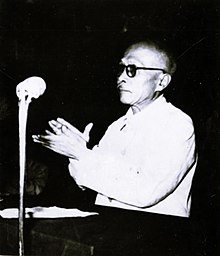Tôn Đức Thắng
Tôn Đức Thắng (born August 19, 1888 in My Hoa Hung, Dinh Thanh District, An Giang Province , † March 30, 1980 in Hanoi ) was a Vietnamese politician .
biography
Tôn Đức Thắng was involved in the anti- colonial movement early on , but joined the French Navy in 1912 . It is alleged that he served on a French battle cruiser in 1919 while serving against the Soviet revolutionaries in the Black Sea near Sevastopol . He is said to have taken part in an uprising that led to the capture of his ship by the Bolsheviks . Later versions of this story add that it was he who hoisted the insurgents' red flag on the ship. However, none of these reports are substantiated - it is very likely a myth that was intended to legitimize the revolutionary movement in Vietnam and to associate it with the origins of the Soviet Union.
After his discharge from military service , he returned to Vietnam in 1920 and was sentenced to 20 years of forced labor on the prison island of Côn Đảo (Poulo-Condore) off the coast of South Vietnam for his revolutionary activities in 1929 .
He was released from prison after the August 1945 Revolution led by Ho Chi Minh , which led to the establishment of the Democratic Republic of Vietnam (North Vietnam) on September 2, 1945.
In 1951 he was appointed President of the Association of the National People's Front (Hoi Lien Hien Quoc Dan Viet Nam (Lien Viet)). After the Indochina Conference in Geneva in 1954, which led to the recognition of the supremacy of the Việt Minh in North Vietnam, the Lien Viet was renamed the Patriotic Front (Mặt trận Tổ quốc Việt Nam), which under his chairmanship became the umbrella organization for mass organizations . In this capacity also tried to unite with South Vietnam .
In addition, he was chairman of the Soviet-Vietnamese Friendship Society from 1950 to 1969 and received the International Stalin Peace Prize in 1956 for his negotiations during the Indochina Conference .
At the same time he was also first Vice-President and then, as the successor to Bùi Bằng Đoàn, between 1955 and 1960 Chairman of the Standing Committee of the National Assembly (Quốc hội Việt Nam) and thus President of Parliament .
In 1960 he was appointed Vice President of North Vietnam. As such, after Ho Chi Minh's death on September 2, 1969, he succeeded him as President of North Vietnam .
After reunification and the establishment of the Socialist Republic of Vietnam on July 2, 1976, he became President of Vietnam and held this largely ceremonial state office until his death.
Web links
swell
- ↑ Christoph Giebel, Imagined Ancestries of Vietnamese Communism: Ton Duc Thang and the Politics of History and Memory (Seattle: UW Press, 2004), pp. 100-133
| personal data | |
|---|---|
| SURNAME | Tôn, Đức Thắng |
| ALTERNATIVE NAMES | Thang, Ton Duc (wrong name form) |
| BRIEF DESCRIPTION | Vietnamese communist politician |
| DATE OF BIRTH | August 19, 1888 |
| PLACE OF BIRTH | My Hoa Hung, Dinh Thanh District, An Giang Province , Vietnam |
| DATE OF DEATH | March 30, 1980 |
| Place of death | Hanoi , Vietnam |
